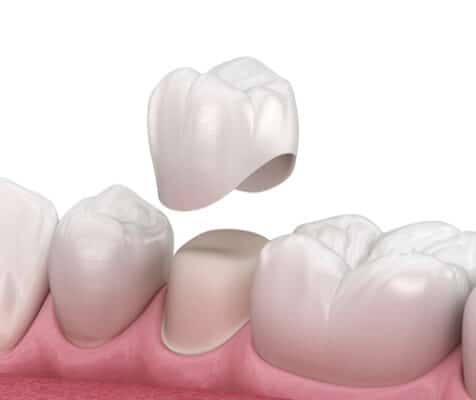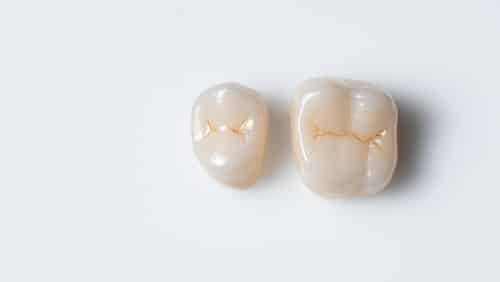Dental Crowns in Countryside, IL
Crowns are the most common restorative dental procedure in the United States. They can help people who have had cavities and other dental damage, preventing infections from spreading and protecting the affected tooth. Learn more about the dental crowns we offer at Hope Dental.
What Are Dental Crowns?
 Dental crowns are caps that cover damaged teeth. Over time, your teeth suffer damage due to injuries, decay, or just normal wear and tear. This damage can allow bacteria into the tooth, affecting the pulp and leading to infections that put the whole tooth at risk.
Dental crowns are caps that cover damaged teeth. Over time, your teeth suffer damage due to injuries, decay, or just normal wear and tear. This damage can allow bacteria into the tooth, affecting the pulp and leading to infections that put the whole tooth at risk.
A dental crown works like a shield, keeping bacteria out while restoring the shape, color, and size of the tooth.
Dental crowns can be good ideas for people who need to:
- Protect a weak tooth
- Cover a tooth that had a root canal
- Hold a dental bridge in place
- Restore a broken tooth
- Support a tooth with a large filling
- Cover a misshapen tooth
- Cover a discolored tooth
There are various types of dental crowns. A traditional crown will cover the entire surface of the tooth, while three-quarter crowns and onlays cover only parts of the tooth. These smaller crowns might be more appropriate if you have a solid tooth structure.
Dental Crown Materials
Dental crowns come in different materials. The best option for you will depend on your budget, the area the crown will be placed, and a few other factors.
Metal Crowns
Many metals make excellent dental crowns, including gold, nickel, chromium, and palladium.
Some of the benefits of metal crowns are that they do not chip or break easily, and they can last a substantial length of time. They also do not require us to remove as much of your tooth as other options. Metal dental crowns can be a good choice for back molars.
Ceramic or Porcelain Crowns
Ceramic or porcelain dental crowns provide the most natural color and can be a good choice if you have metal allergies. They can wear the teeth next to them a bit more than metal crowns do. Because of their natural look, many patients choose them for front teeth.
Porcelain-Fused-to-Metal Crowns
Porcelain-fused-to-metal dental crowns offer the benefits of metal crowns with the natural look of porcelain ones. In some cases, the metal can still be visible, so these dental crowns are better suited for back teeth.
Resin Crowns
Resin dental crowns are more affordable than other options. They can wear down more rapidly, however.
Pressed Ceramic Crowns
Pressed ceramic dental crowns have a hard core and a porcelain cap for a natural look. They are stronger and longer-lasting than an all-porcelain crown.
Benefits of Dental Crowns
Dental crowns can help relieve the discomfort that weakened teeth cause. If you have a damaged tooth, it might be sensitive to hot and cold drinks and foods, as well as to pressure. The dental crown protects the tooth and reduces discomfort.
 If a tooth cracks or is severely decayed, sometimes the only two options are to extract the tooth or to cover it with a dental crown. In this way, dental crowns can save a severely damaged tooth.
If a tooth cracks or is severely decayed, sometimes the only two options are to extract the tooth or to cover it with a dental crown. In this way, dental crowns can save a severely damaged tooth.
Another benefit of dental crowns is that they can help restore the way a tooth looks. They can correct discoloration, chips and cracks, irregular shapes, and other concerns.
Dental crowns are also a long-lasting treatment option. They generally last between 10 and 15 years.
Procedure for Dental Crowns
When you schedule your Free consultation with us, we will assess the tooth or teeth that need treatment. We will take X-rays of the tooth and the bone around it. If the tooth has an infection, we might need to first perform a root canal to remove the infected pulp.
We will ask about your oral hygiene routine, whether you have any medical conditions, and if you take any medications or supplements.
During this first visit, you also have the chance to ask questions about the procedure and costs. We will always provide a breakdown of the expenses and work with you to find the best payment options, including third-party financing.
If you have dental anxieties, we can also provide sedatives for the procedure.
To prepare a tooth for a crown, we will carefully file the sides and top to make space. How much we file down will depend on the material of the crown. All-metal crowns, for example, are thinner than porcelain ones.
If a lot of your tooth is missing because of an injury or decay, we will have to build it up with filling material to provide enough structure for the crown.
Once we shape the tooth, we will make an impression of it with putty. We can also make impressions of the teeth above or below the tooth to ensure a comfortable bite. We then send these impressions to the lab that will create the crown. While we wait, we will place a temporary crown on the affected tooth.
On your second visit, we will place the permanent crown on your tooth to check the fit and color. If everything works right, we will use a local anesthetic to numb the treatment area and cement the crown into place. If you asked for a sedative, make sure to have someone with you who can take you home after the procedure.
Caring for Dental Crowns
To help a dental crown last as long as possible, make sure to keep it clean. You want to brush your teeth, including the crown, at least twice a day to remove plaque and to keep them looking their best.
Remember to also floss. Sometimes, food particles can remain between the crown and neighboring teeth, potentially leading to a buildup of bacteria. You can also use mouthwash regularly to remove bacteria.
Try to avoid sticky or hard foods. Sticky foods can loosen the crown, making it less effective, and hard foods can crack porcelain and ceramic.
Porcelain and ceramic crowns resist staining naturally. Do not use whitening strips or any similar whitening options because they can damage the crown’s surface.
If you grind your teeth at night, you will want to get a mouth guard. The pressure your jaws put on crowns can crack them. If you have habits like chewing your fingernails or biting on ice or other hard objects, try to change these habits to avoid cracking or dislodging the crowns.
It is also important that you make regular appointments with us so that we can monitor your oral health as well as the condition of your dental crowns. If we notice cracks or chipping in a crown, we will have to replace it.
Protect Damaged Teeth with Dental Crowns
If you have damaged teeth, one of the best treatment options is to get dental crowns. Dental crowns can prevent having to remove the tooth from its socket while also improving the way the tooth looks.
Why struggle with the limitations that broken or decayed teeth can place on you when you can get help from an expert? At Hope Dental in Cook County, IL, we offer dental treatments you can depend on. Dr. Russell Ras has over 30 years of experience and, using the latest technologies available, can help you regain the use of damaged teeth.
Questions & Answers
Do dental crowns hurt? Thanks to the local anesthesia, there is no pain at all during the crown procedure. There may be a little soreness or pain in the gums after the procedure has been completed but this typically does not last very long and your teeth will be feeling better and stronger than ever in no time.
Crowns offer a solution to restore the structure, strength, and appearance of your teeth. Teeth tend to crack, decay and discolor over time and a crown is able to restore your tooth back to its normal function, making it easier to chew, bite, and of course, smile with confidence.
Once your crown is placed it’s important to keep on top of your oral hygiene. Brushing twice a day, flossing, and of course continuing to see your dentist twice a year are all important factors in maintaining your dental crown. We also encourage you to keep away from chewing extremely hard foods, such as candy, to keep your porcelain crown from breaking.
Each situation is unique and the price depends on the complexity of the situation. We will provide you with all the information you need after Dr. Ras has examined you.
Most insurances provide coverages for crowns.
